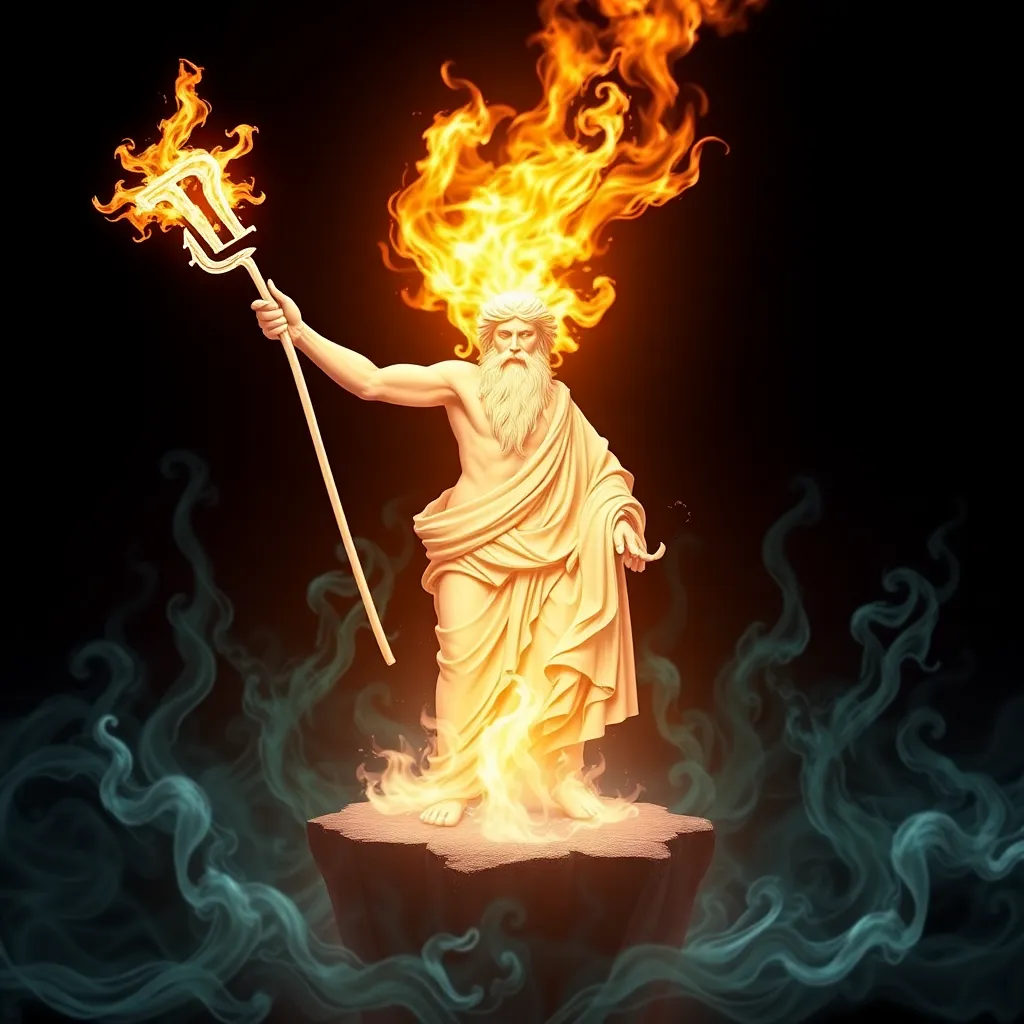The Symbolism of Fire in Hephaestus’ Mythology
I. Introduction
Hephaestus, the Greek god of fire and forge, occupies a unique position in the pantheon of deities. Known for his craftsmanship and creativity, Hephaestus embodies the complex nature of fire itself. The significance of fire as a symbol in his mythology transcends mere physicality, representing both creation and destruction, knowledge and ignorance, as well as passion and isolation. This article aims to explore the multifaceted symbolism of fire in Hephaestus’ mythology, shedding light on how it reflects not only his character but also broader themes in Greek mythology.
II. Hephaestus: The God of Fire and Forge
Hephaestus, often referred to as the god of fire and craftsmanship, is one of the Twelve Olympian gods. His origins are as fascinating as his creations. According to myth, he was born to Hera alone, or in some versions, he is the son of both Hera and Zeus. Unlike the other gods, Hephaestus was cast out of Olympus due to his physical deformities, landing on the island of Lemnos.
In the pantheon of Greek gods, Hephaestus plays a significant role as the divine artisan. He is not merely a god of fire; he is the embodiment of the creative process itself. His connection to fire is not just through its destructive qualities but also through its ability to forge and create, making him a vital figure in the mythological hierarchy.
III. Fire as a Creative Force
Fire has long been associated with creativity and transformation, and in Hephaestus’ case, it serves a dual purpose. It is through fire that he forges weapons, tools, and various other creations for the gods and heroes.
- The Role of Fire: Fire is essential in the forging process, allowing Hephaestus to shape metals into masterpieces. His forge, often described as a fiery workshop, is where raw materials are transformed into divine artifacts.
- Symbol of Transformation: Fire represents change and innovation. The act of creation in Hephaestus’ forge is a powerful metaphor for personal growth and transformation.
- Examples of Hephaestus’ Creations: Some of his most notable creations include:
- The shield of Achilles
- The chains that bound Prometheus
- The golden automatons that served the gods
IV. Fire and Destruction: The Dual Nature
Despite its role as a creative force, fire is equally potent in its capacity for destruction. In mythology, fire often brings chaos and calamity, highlighting its dual nature. Hephaestus, while known for his craftsmanship, also harnesses fire’s destructive potential.
- Destructive Potential: Instances of fire leading to chaos can be found throughout mythology, such as the destructive fires set by the gods during battles.
- Instances of Chaos: One notable example is the creation of the Cretan bull, which led to the birth of the Minotaur, a creature that wreaked havoc on Crete.
- Balance of Creation and Destruction: Hephaestus’ work often reflects the balance between creation and destruction, illustrating that the same fire that forges can also consume.
V. Fire as a Symbol of Knowledge and Enlightenment
Fire is not only a physical element but also a metaphor for knowledge and enlightenment. It has been associated with technological advancement and the spark of inspiration throughout history.
- Connection to Technological Advancement: In many cultures, fire symbolizes the ability to innovate and create new technologies. Hephaestus embodies this aspect through his ingenious inventions.
- Metaphor for Inspiration: Fire serves as a metaphor for the inspiration that fuels creativity. Just as fire illuminates the darkness, Hephaestus lights the path to innovation.
- Bringer of Skills and Wisdom: Hephaestus is often seen as a teacher to mortals, imparting skills and knowledge that enable them to improve their own craftsmanship and creativity.
VI. The Role of Fire in Hephaestus’ Personal Relationships
Hephaestus’ relationships, particularly with Aphrodite, highlight the emotional complexity of fire as a symbol. His marriage to the goddess of love is fraught with tension and contrasts.
- Marriage to Aphrodite: While Hephaestus represents stability and craftsmanship, Aphrodite embodies beauty and desire, leading to a tumultuous relationship.
- Impact on Relationships: His fiery nature sometimes results in feelings of jealousy and inadequacy, particularly given Aphrodite’s infidelity with Ares, the god of war.
- Feelings of Isolation and Rejection: The fire that represents his creativity also reflects his emotional struggles, creating a sense of isolation stemming from rejection by both gods and mortals.
VII. Cultural Interpretations of Fire in Hephaestus’ Myth
The symbolism of fire in Hephaestus’ myth extends beyond ancient Greece, influencing various cultures and interpretations over time.
- Variations Across Cultures: Different cultures have depicted fire in various ways, often associating it with knowledge, power, and transformation.
- Modern Interpretations: Hephaestus’ legacy can be seen in modern stories, films, and literature, where the themes of creation and destruction continue to resonate.
- Representation in Art: Fire has been a powerful motif in art, symbolizing passion, creativity, and the duality of existence through Hephaestus’ narrative.
VIII. Conclusion
In conclusion, the symbolism of fire in Hephaestus’ mythology is rich and multifaceted, reflecting both the creative and destructive aspects of this powerful element. Hephaestus stands as a testament to the enduring significance of fire, representing not only craftsmanship and innovation but also the complexities of personal relationships and emotional struggles. As we explore contemporary culture, the legacy of Hephaestus and the symbolism of fire continue to inspire and provoke thought, reminding us of the duality inherent in the human experience as both creator and destroyer.




